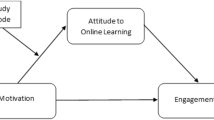Abstract
This research compared the effectiveness of Peer-Centered (PC) and Instructor-Centered (IC) formats for Teaching-Assistant-led discussion sections in chemistry. In addition, an Aptitude-Treatment Interaction (ATI) was hypothesized, such that self-described “collaborative” students would report more learning from the PC format and “competitive” students would benefit more from the IC format. The PC format utilized small subgroups and student presentations, while in the IC format the Teaching Assistant lectured, solved problems, and answered questions. The two sections were approximately equal in overall learning, except that more learning from fellow students occurred in the PC sections. The expected ATI effect was found. In addition, students with interpersonally oriented learning styles benefited more from interactive learning opportunities (such as sections), while those with other learning styles gained more from impersonal media (such as textbooks).
Similar content being viewed by others
References
Cronbach, L. J., Beyond the two disciplines of scientific psychology.American Psychologist 1975,30 116–127.
Cronbach, L. J., & Snow, R. E.,Aptitudes and instructional methods. New York: John Wiley, 1977.
Davis, R., Learning By Design.New directions for higher education 1977,17 17–32.
Domino, G., Differential prediction of academic achievement in conforming and independent settings.Journal of Educational Psychology 1968,59 256–260.
Domino, G., Interactive effects of achievement orientation and teaching style on academic achievement.Journal of Educational Psychology 1971,62 427–431.
Domino, G., Let the punishment fit the crime: teacher-student interactions.Journal of Educational Research 1975,69 8–11.
Dowaliby, F., & Schumer, H., Teacher-centered versus student-centered model of college classroom instruction as related to manifest anxiety.Journal of Educational Psychology 1973,64 125–132.
Dubin, R., & Taveggia, T.,The teaching-learning paradox: a comparative analysis of college teaching methods. Eugene Ore.: Center for Advanced Study of Educational Administration, University of Oregon, 1968.
Goldberg, L.,Student personality characteristics and optimal college learning conditions. Oregon Research Institute Research Monograph 9, No. 1. 1969.
Goldman, R. D., & Hewitt, B. N., An investigation of test bias for Mexican-American college students.Journal of Educational Measurement 1975,12 187–196.
Goldman, R. D. & Hewitt, B. N., Predicting the success of black, Chicano, Oriental, and white college students.Journal of Educational Measurement 1976,13 107–118.
Grasha, A. F., Observations on relating teaching goals to student response styles and classroom methods.American Psychologist 1972,27 144–147.
Grasha, A., & Reichmann, S.,Correlates of the student learning styles scale. Unpublished paper. Cincinnati, Ohio: University of Cincinnati, 1973.
Reichmann, S. W., & Grasha, A. F., A rational approach to developing and assessing the construct validity of a student learning style scales instrument.Journal of Psychology 1974,87 213–223.
Rogers, C.,Freedom to learn. Columbus, Ohio: Charles E. Merrill, 1969.
Runkel, P., Harrison, R., & Runkel, M.The changing college classroom. San Francisco: Jossey-Bass, 1969.
Author information
Authors and Affiliations
Rights and permissions
About this article
Cite this article
Andrews, J.D.W. Teaching format and student style: Their interactive effects on learning. Res High Educ 14, 161–178 (1981). https://doi.org/10.1007/BF00976292
Issue Date:
DOI: https://doi.org/10.1007/BF00976292




